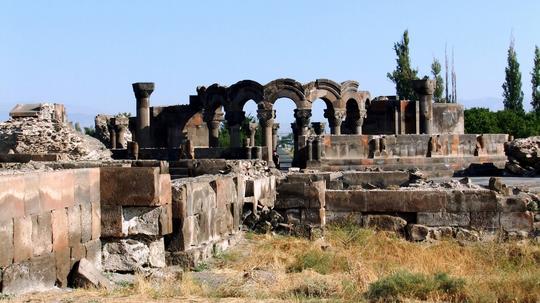
Working in Cambridge, arguably one of the world’s largest enclaves for entrepreneurs, I never cease to be amazed at the incredible creativity that I am privileged to come in contact with every day. My company, Flagship Pioneering, was founded on the very premise of entrepreneurialism.
As a proud immigrant of Armenian decent and an entrepreneur, I joined investment banker Ruben Vardanyan and Vartan Gregorian, President of the Carnegie Corporation – two global leaders who also are of Armenian descent, to find a way to express our gratitude towards the saviors who stood up in the face of adversity and saved our ancestors during the Armenian Genocide 100 years ago. Much like Flagship Pioneering takes an entrepreneurial mindset to deliver groundbreaking solutions in medicine, food security and sustainability, we approached this important initiative with the aim to both inspire action and raise awareness to the world’s most pressing humanitarian challenges. Embracing the same tenets as we do at Flagship, we started with “What If?”. We created a movement to acknowledge and promote the Power of One – the selfless work of the individuals who work to make the world a better place from the grassroots level. Our movement is driven by the concept of ‘Gratitude in Action’ – that those survivors who owe their chance at life to the generosity of others will, in turn, take similar action to save others.
But how can we enact Gratitude in Action with so much strife in the world? World Refugee Day, honored this year on June 20, is yet another opportunity to call attention to the persistent conflict and persecution that is driving mass human displacement around the world has risen to staggering heights. In fact, one in 122 humans on the planet is currently displaced. That equates to a staggering 65 million people globally – a total that, if a country, would make it the 24th most populous in the world. We are living in the wake of the world’s unconscionable inaction to this tragedy as the number of refugees continues to swell. And the attitudes towards the refugee crisis is equally concerning. In fact, the 2017 Aurora Humanitarian Index, a global survey that tracks the motivations behind humanitarian support, found that the majority of respondents have no confidence in global organizations like the UN, European Union and others, being able to effectively manage the refugee crisis. Additionally, 4 in 10 respondents feel their culture is threatened by ethnic minorities, and 40 percent believe migrants take out more than they give to their country.
Our response to these issues was to launch the Aurora Prize for Awakening Humanity, an annual $1.1 million humanitarian award that recognizes the selfless courage, commitment and impact of individuals who tackle these very challenges at great personal risk. We took an entrepreneurial approach by not simply making this an award but guaranteeing the winner receives $100,000 for their service, and granting them an opportunity to designate one million dollars to donate to a charity or charities that inspired their work. This creates gratitude in action.
An example of Gratitude in Action is the inaugural Aurora Prize Laureate Marguerite Barankitse, who was selected last year for saving 30,000 children from certain death during the Burundi civil war. In turn, she dedicated the one million dollar prize to a number of charities across seven countries to create an amplifying effect benefitting those in need in Brazil, Ethiopia, Democratic Republic of Congo and Rwanda.
Research shows that individuals are driven to action around humanitarian crises– volunteering, donating and getting involved – if they are provided with compelling stories. That is just what the Aurora Humanitarian Initiative does. Stories like the 2017 Aurora Prize Laureate, awarded this week to an American missionary doctor operating in war-ravished Sudan who cares for nearly a half-million people spanning a geography the size of the state of Georgia amidst aerial bombardments, famine and lack of humanitarian aid.
The fact that the G7 leaders who met last month did not once address the refugee crisis proves that we cannot rely on the government to solve this critical issue facing mankind. As we observe World Refugee Day this year, I call upon business, academia, media, and civil society to explore the issue from a new lens and draw upon solutions that have proven to work. By taking an entrepreneurial approach that, at its center asks “What if? Why not?”, we are indeed capable of making a positive impact on the world.








